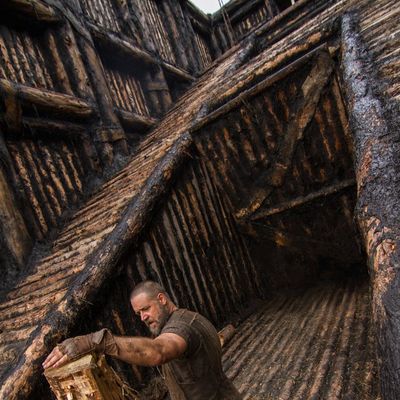
Is there a more resonant indication of the religious right’s dementia than its preemptive strike against Darren Aronofsky’s Noah for making its hero an “environmentalist wacko?”—a sort of biblical Bill McKibben? What in heaven’s name were they expecting? In the Old Testament original, God wipes out all but a handful of people while ensuring the survival of every sort of beast — and yet the fundamentalists are incensed because the movie’s Noah doesn’t eat meat and thinks that humans have been poor caretakers of their God-given Earth. They should be delighted that, in an age marked by nihilism and widespread dismissal of Judeo-Christianity as a bunch of mismatched fairy tales, a $125 million Hollywood movie peddles the idea of an all-seeing deity with the power and inclination to wipe out humanity as a punishment for moral degeneracy. Like it or not, this apocalyptic film has been made by an artist who believes in the authenticity of religious visions.
It has also, alas, been made by an artist in thrall to an all-seeing studio with a lot of money on the line, which means it’s Aronofsky’s least personal work. So you get a fat dose of conventional melodrama with your Old Testament: It’s the antediluvian Gladiator. The bad guys are identified as descendants of Cain, the original fratricidal sinner, and they’ve been busy wiping out the spawn of the brother that came after Abel, Seth. (Poor Seth, the overlooked sibling. I’d forgotten all about him — you?) Few of Seth’s progeny are left. There’s Russell Crowe’s Noah; Crowe’s wife from A Beautiful Mind (Jennifer Connelly) as Noah’s spouse, Naameh; their kids Ham (Logan Lerman), Shem (Douglas Booth), and Japheth (Leo McHugh Carroll); and a rescued orphan who grows up to be Hermione Granger and goes by the name Ila. While the Cain-ites kill, fornicate, eat meat, and despoil the natural world, the Seth-ites cower amid rocks, tilling their veggies and hoping for a miracle.
And then it comes. Noah dreams that God — here referred, also to the right’s mysterious ire, as “Creator” — will give the Earth what we’d nowadays call a “reboot.” He has another, similar vision after his hermit grandfather (Anthony Hopkins — yes, him again) gives Noah a drink laced with the biblical equivalent of acid. Noah and his family get busy building a great ark, much to the displeasure of Ray Winstone’s Tubal-cain, the man who killed Noah’s father (backstory!) and doesn’t care much for Noah, either.
Winstone’s snarling Tubal-cain is more fun than Russell Crowe’s priggish Noah, but the role is an excrescence. It’s there so Noah can build to an action climax along the lines of President Harrison Ford kicking terrorist Gary Oldman off Air Force One while snarling, “Get off my plane!!!” This is, “Get off my Ark!” Another multiplex-friendly addition is the group of angels who’ve fallen to Earth and become boulders that now and again assemble themselves into giants like primordial Transformers, trash-talking Noah and throwing things at the Cain-ites. They’re impressive, though. In an inspired touch, one of the giant rock creatures is voiced by the gravelly Nick Nolte – an inspired match.
The chief invention of Aronofsky and his co-writer Ari Handel is to make Noah pull a sort of Abraham. That is, he comes to believe the Creator wishes him to save the animals — as innocent now as they were in the Garden of Eden, he says — but sacrifice the vile humans, including his own kids and grandkids. So in the last part of the film, Noah spends a lot of time chasing people around the ark like it’s a slasher movie while his wife and kids plead for mercy. Why not? Maybe this Noah is a bit unhinged, but it’s not as if he’s totally out of his mind: The foreordained floodwaters did come. And why wouldn’t the God of the Old Testament want to scrap the beta version of humanity and give it another go?
Crowe never goes soft on the character: Noah is a grave, traumatized, unlikable man. It’s a bracing conceit, and there’s a scene in which he lets a helpless character perish — to the horror of his son — that’s genuinely shocking. But a protagonist this inflexible doesn’t have the kind of stature you’d hope for in a biblical epic. He’s a bit monotonous — a bit of a thickie.
Probably we’d identify with him more if Aronofsky took us into his head more often. The director’s other films are told from the inside out: the brilliant mathematical fever dream, Pi; the jittery tale of addiction in all its forms, Requiem for a Dream; the potent psychodramas The Wrestler and Black Swan, with their protagonists compelled to ever-higher heights of self-abuse. Each character in his or her disastrous way longs for a sense of connectedness, a higher power. That’s what Aronofsky’s Noah taps into, which is why the films most vivid scenes are the dreams and visions, not the conventional spectacle.
You do need spectacle in an apocalypse, though, which here means a ton of computer-generated imagery. Animal activists are evidently pleased that not only were no animals harmed, no animals were used. The river of beasts flowing into the ark is an awesome sight. But then the animals go to sleep and cease to be a factor. And there’s a puzzling omission: We never see them stir when the waters recede and head out into the new world. It would have cost a few million more — but as Butch Cassidy would say, “Small price to pay for beauty.”
Despite its compromises, I like Noah well enough. It grounds the biblical apocalypse in the here and now, tapping into the dystopian mood while retaining a sense of religious awe. Maybe that’s why the fundamentalists hate it. It makes too much damn sense.


